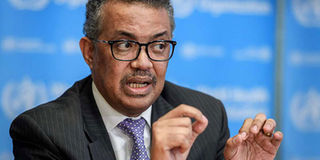Africa deserves equal respect, not racism, on the global stage

World Health Organisation Director-General Tedros Adhanom Ghebreyesus speaks during a daily press briefing on Covid-19 virus at the WHO headquarters in Geneva on March 9, 2020. PHOTO | FABRICE COFFRINI | AFP
What you need to know:
- Representation at the highest echelons of the UN should not stop at patchy appointments of individuals from the global south as a box-ticking exercise to justify diversity.
- The world yearns for new international norms that encompass the desires and interests of the UN member states equally.
Amid the engaging war on Covid-19, the World Health Organisation was sidetracked to deal with racism allegations against Director-General Tedros Adhanom Ghebreyesus.
But Dr Ghebreyesus has accused Taiwan of being behind a campaign against him. The Ethiopian claims he was called names like ‘black’ and ‘negro’.
If, indeed, it is true, then that is racism — a language that should have died in the first recorded pandemic of the Plague of Justinian in the First Century.
It is frustrating to see that a world that has reached engineering, scientific and technological milestones is unable to find a lasting solution to racism.
American President Donald Trump added fuel to the fire by accusing the WHO of being “China-centric” in its approach on Covid-19 and decided to de-fund it.
The United States blames China for the coronavirus pandemic, saying it should have acted sooner by reporting the spread of the virus in Wuhan.
Destructive geopolitics has, yet again, taken centre stage. The timing of the US-China Covid-19 spat and America’s defunding of the WHO are ill-timed. International cooperation is required now more than ever before.
The issue of racism on the global stage also did arise when Kofi Annan, a Ghanaian, was appointed secretary-general of the United Nations in 1997.
Which begs the question, do the developed countries have a problem with one of its member countries from the global south heading a UN agency or, indeed, being the secretary-general?
CONFLICT ESCALATION
The UN ethos is based on the ideal that all members states are equal. The body has 193 members, sovereign countries, and two observer members (The Vatican City and Palestine).
Its formation was inspired by the desire to create a more peaceful world after two bruising world wars. With its current motto “peace, dignity and equality on a healthy planet”, the UN came into ‘official existence’ in October 1945, soon after World War II.
Calls of “Never Again!” followed, with a promise to avert a recurrence of atrocities. But has it?
In the past three decades alone, wars have gone on unabated, especially in the global south, some with UN’s approval and others without the requisite UN resolution.
Failure to stop wars, especially in developing countries, has created instability in the world. That negates the key principles of the UN as an institution mandated to preserve global peace and security, what with its underwhelming responses.
The UN Security Council, with only five permanent members — China, Russia, France, the United Kingdom and the US — is crying for reforms.
This status quo has existed for all those 75 years of the UN! Most of the countries from the global south tend to have a peripheral seat in the powerful UNSC.
One would think, given the impact of war, poverty and inequality in the world, the UN would have been reformed to have stronger representation from countries in the global South.
REGIONAL BALANCE
To be fair to the UN, it did make a raft of changes to diversify its leadership, but a lot more needs to be done.
Africa has so far had Egyptian Boutros-Boutros Ghali and the late Annan as secretaries-general. And recently, the UN appointed its first ever female deputy secretary-general in Amina J. Mohammed of Nigeria. Dr Tedros is the first African to head the WHO.
But representation at the highest echelons of the UN should not stop at patchy appointments of individuals from the global south as a box-ticking exercise to justify diversity.
It should be a true reflection of the UN membership. Diversity needs to be seen and felt in the UNSC, too, with permanent seats shared between the global north and south.
Western countries, even those in the UNSC, have in many cases been implicated in, or perpetrated, war in the global south.
Many of the wars since 1945 were fought either in Asia, Africa or the Middle East.
The UN’s founders seem to have silenced guns in their territories but took them to countries less capable of defending themselves, hence the need for permanent UNSC seats for the global south for regional balance.
NEW WORLD ORDER
The world yearns for new international norms that encompass the desires and interests of the UN member states equally.
The current ones have served the interests of a few and are not sustainable. A new world order, built on an honest pursuit of global peace and stability, is needed.
Stereotyping of member states from the developing world will continue if positive changes are not instituted.
The two French doctors who recently raised a storm with their racist suggestion that Africa be the testing ground for Covid-19 vaccine exemplifies how the world still perceives Africa as a primitive ‘dark continent’.
But what is primitive is racism, discrimination, inequality and wars, which have no place in the modern world.
Ms Guyo is a legal researcher. [email protected] @kdiguyo





